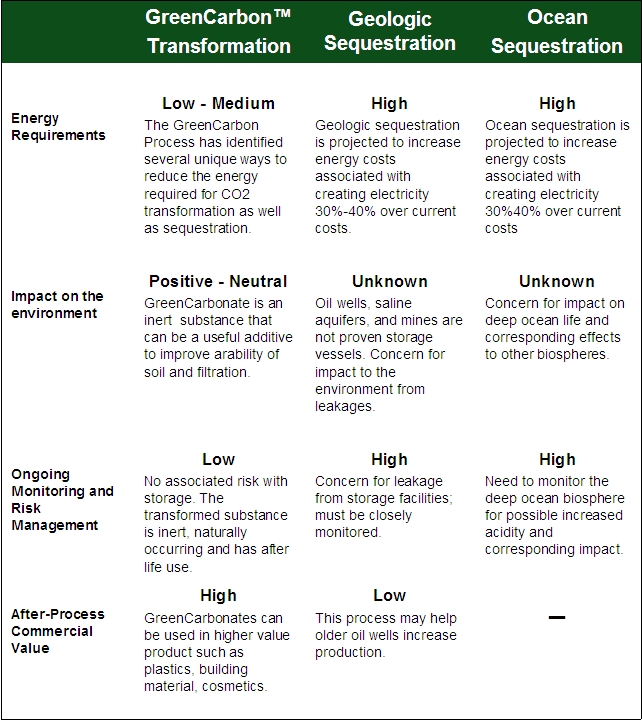From gas to solid, that's not just physics, that's green tech

Every inspirational speaker will tell an audience to take a negative and turn it into a positive. Politically CO2 emissions have become a negative in many parts of the world. CO2 is deemed to be one of the greenhouse gases that's lending its chemical and physical properties to processes that seem to be heating up the earth's atmopshere. While political arguments rage over whether the global warming is real or worth worrying about, many nations msigned the Kyoto Protocol and are moving ahead with taxes and/or regulations on CO2 and greenhouse gases. That's the negative.
Carbon Sciences has a way to turn that into a positive. You got your CO2, how would like to have it become a useful, stable, non-polluting solid? Presto change-o, we got your calcium carbonate (chalk) right here. And that can be used in buildings or as raw material in numerous industries. Chalk is already a globally marketed raw material.
CO2 is an inevitable by-product for many industires, especially those depending on fossil fuels for energy. CSA expects the world to be largely fossil fuel dependent for the next 150 years. That's a pretty long business outlook these days. As those fossil fuel emissions become a greater tax or regulatory liability for corporations, Carbon Science sees its new process for converting CO2 to chalk as a business solution that many industries will pay for.
I recently spoke with CS's CEO, Derek McLeish. He explained that CS will actually take TWO negatives to produce the positive, chalk. They will combine CO2 emissions with mine tailings and similar waste solids. In some parts of the U.S. these tailings have been "stored" in pits or piles for over a century. Just waiting, it would seem, for Carbon Sciences to come along.
CS and McLeish argue persuasively that sequestration by burial is not a great idea. That entails pumping CO2 into underground cavities and trying to keep it there. Forever? Is it safe? Just wait'll a huge leak opens, it's one scanario you don't want to contemplate. There were plans to put a Future-Gen coal burning plant at Mattoon, Illinois, and pump all that CO2 back into the ground. Future headline? "Mattooniacs gassed by CO2 release."
So far, there's limited use of undergrounding CO2, mostly by oil companies uing it to force oil up from wells.
Nobody will be hurt by chalk unless you drop wallboard on them. If the chalk market isn't enough, CS can turn to CO2 into Calcium bicarbonate, and that's good for anybody whose business worries are causing intestinal distress. A soothing thought, all that bicarb.
CS already has a mobile conversion plant touring the U.S. Our partners at CNET did a video of it. Michael Kanellos also did a CNET blog on CS.
The amount of material involved is enorous when looked at globally. A megaton of CO2 plus the solids involve din conversion would produce enough chalk to cover 4 soccer fields to a depth greater than 25 feet. Man, that;s a lot of wallboard.
The business model: payment to CS by industries that HAVE to find an outlet for their CO2 besides releasing it into thre atmosphere. The mine tailings are going to come cheap. There are transportatoion and energy costs involved in the conversion process. Then there is chalk, or bicarb, to be sold. Solid waste removal and processing companies make money all over the world now. CS sees a time with gaseous waste removal is just as viable a business.
